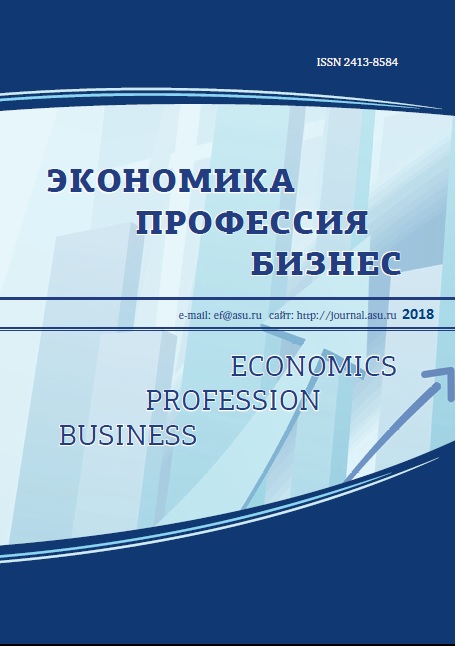THE EFFECTIVENESS OF CROWDSOURCING IN AN ORGANIZATION (EXAMPLE OF JSC “SBERBANK OF RUSSIA”)
Abstract
The major objective of economic reforms in Russia is to create innovative market economy. Innovative way of any business is based primarily on the intellectual and creative potential of employees, and whole society. Open this potential allows a crowdsourcing; it is a new technology for the domestic market.This article discusses the possibility of evaluating the effectiveness of using crowdsourcing in an organization. The essence of crowdsourcing is studied. Crowdsourcing classifications are defined. A scheme of interaction between participants crowdsourcing project in the organization is highlighted, key roles of participants are described. Components that make up the effect of using this technology in company are highlighted. The performance and effectiveness of crowdsourcing activities are compared. Indicators to assess the effectiveness of crowdsourcing in the organization are highlighted. Identify the most effective ways to improve the quality of this technology.The article analyzes the efficiency of using the crowdsourcing on example of JSC “Sberbank of Russia”. The costs and benefits of using this technology in the bank in 2012 are compared. The effectiveness of two crowdsourcing projects to finalize documents in bank is studied. It is shown that the effectiveness of crowdsourcing depends largely on engagement participants in this process.Downloads
Metrics
References
Azgaldov G. (1996). On account of quality category when calculating the comparative effectiveness of objects. Economics and Mathematical Methods, 32 (3), 66–84.
Crowdsourcing in JSC “Sberbank of Russia”. (2013). Retrieved from. URL: http://www.slideshare.net/wikivote/ss-19546252
Endovitskii D. A., Lyubushin I. E., Babicheva B. C. (2013). Resource economic analysis: theory, methodology, practice // Economic analysis: theory and practice, 2013. № 38, P. 2–8.
Gafforov E. B., Merkushova N. I. (2013). Analysis of use crowdsourcing in innovative business models // Economic analysis: theory and practice. 2013. № 40. P. 2–11.
Horton J. J., & Chilton L. B. (2010). The labor economics of paid crowdsourcing. In Proceedings of the 11th ACM conference on Electronic commerce (pp. 209–218). ACM.
Howe J. (2006). The rise of crowdsourcing. Wired magazine, 14 (6), 1–4.
Huberman B. A., Romero D. M., & Wu F. (2009). Crowdsourcing, attention and productivity. Journal of Information Science.
Ideas of Sberbank. (2013). Retrieved from http://idea.sberbank21.ru
Ignatov D. I., Kaminskaya A. Y., Konstantinova N., Konstantinov A. V. (2014). Recommender system for crowdsourcing platform Witology, in: Proceedings of The 2014 IEEE / WIC / ACM International Joint Conference on Web Intelligence and Intelligent Agent Technology, WI–IAT 2014, 11–14 August 2014 Warsaw, Poland: IEEE Computer Society Conference Publishing Services (CPS), 2014. P. 327–335.
Kamar E., Hacker S., Horvitz E. (2012). Combining Human and Machine Intelligence in Large-scale Crowdsourcing // AAMAS “12 Proceedings of the 11th International Conference on utonomous Agents and Multiagent Systems — Volume 1, p. 467–474
Marjanovic S., Fry C., & Chataway J. (2012). Crowdsourcing based business models: In search of evidence for innovation 2.0. Science and Public Policy, scs009
Raizberg, B. (Ed.). (1998). Modern Dictionary of Economics. Moscow: INFRA-M.
Raykar V. C., Yu S., Zhao L. H., Valadez G. H., Florin C., Bogoni L., & Moy L. (2010). Learning from crowds. The Journal of Machine Learning Research, 11, 1297–1322.
Yuen M. C., King I., & Leung K. S. (2011, October). A survey of crowdsourcing systems. In Privacy, Security, Risk and Trust (PASSAT) and 2011 IEEE Third Inernational Conference on Social Computing (SocialCom), 2011 IEEE Third International Conference on (p. 766–773). IEEE.
Copyright (c) 2018 Economics Profession Business

This work is licensed under a Creative Commons Attribution 4.0 International License.
Economics Profession Business is a golden publisher, as we allow self-archiving, but most importantly we are fully transparent about your rights.
Authors may present and discuss their findings ahead of publication: at biological or scientific conferences, on preprint servers, in public databases, and in blogs, wikis, tweets, and other informal communication channels.
Economics Profession Business (EPB) allows authors to deposit manuscripts (currently under review or those for intended submission to EPB) in non-commercial, pre-print servers such as ArXiv.
Authors who publish with this journal agree to the following terms:
- Authors retain copyright and grant the journal right of first publication with the work simultaneously licensed under a Creative Commons Attribution License that allows others to share the work with an acknowledgement of the work's authorship and initial publication in this journal.
- Authors are able to enter into separate, additional contractual arrangements for the non-exclusive distribution of the journal's published version of the work (e.g., post it to an institutional repository or publish it in a book), with an acknowledgement of its initial publication in this journal.
- Authors are permitted and encouraged to post their work online (e.g., in institutional repositories or on their website) prior to and during the submission process, as it can lead to productive exchanges, as well as earlier and greater citation of published work (See The Effect of Open Access).









